1句子成分基础知识
- 格式:ppt
- 大小:3.81 MB
- 文档页数:40
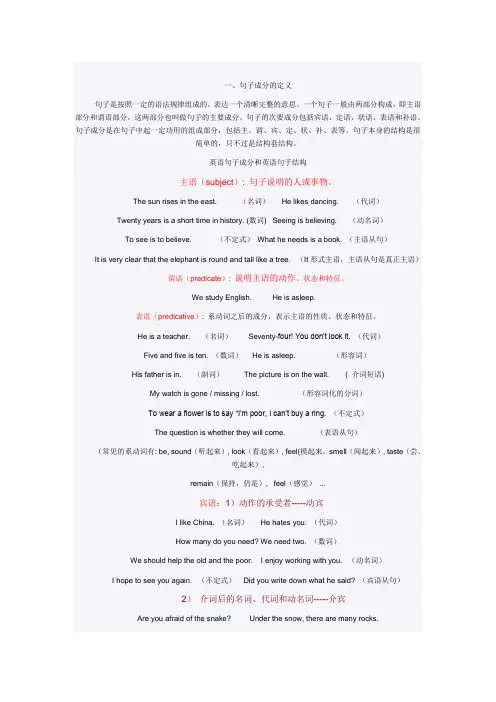
一、句子成分的定义句子是按照一定的语法规律组成的,表达一个清晰完整的意思。
一个句子一般由两部分构成,即主语部分和谓语部分,这两部分也叫做句子的主要成分。
句子的次要成分包括宾语,定语,状语,表语和补语。
句子成分是在句子中起一定功用的组成部分,包括主、谓、宾、定、状、补、表等。
句子本身的结构是很简单的,只不过是结构套结构。
英语句子成分和英语句子结构主语(subject): 句子说明的人或事物。
The sun rises in the east. (名词) He likes dancing. (代词)Twenty years is a short time in history. (数词) Seeing is believing. (动名词)To see is to believe. (不定式)What he needs is a book. (主语从句)It is very clear that the elephant is round and tall like a tree. (It形式主语,主语从句是真正主语)谓语(predicate): 说明主语的动作、状态和特征。
We study English. He is asleep.表语(predicative): 系动词之后的成分,表示主语的性质、状态和特征。
He is a teacher. (名词) Seventy-four! You don’t look it. (代词)Five and five is ten. (数词)He is asleep. (形容词)His father is in. (副词)The picture is on the wall. ( 介词短语)My watch is gone / missing / lost. (形容词化的分词)To wear a flower is to say “I’m poor, I can’t buy a ring. (不定式)The question is whether they will come. (表语从句)(常见的系动词有: be, sound(听起来), look(看起来), feel(摸起来,smell(闻起来), taste(尝、吃起来),remain(保持,仍是), feel(感觉) ...宾语:1)动作的承受者-----动宾I like China. (名词)He hates you. (代词)How many do you need? We need two. (数词)We should help the old and the poor. I enjoy working with you. (动名词)I hope to see you again. (不定式)Did you write down what he said? (宾语从句)2)介词后的名词、代词和动名词-----介宾Are you afraid of the snake? Under the snow, there are many rocks.3)双宾语-----间宾(指人)和直宾(指物)He gave me a book yesterday. Give the poor man some money.宾补:对宾语的补充,全称为宾语补足语。
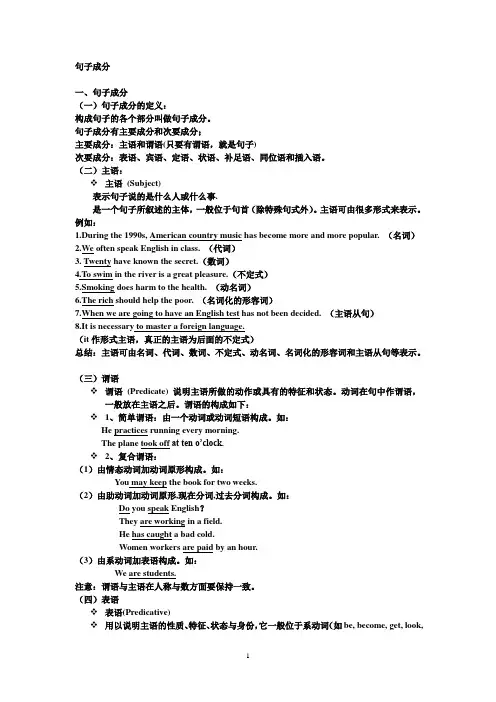
句子成分一、句子成分(一)句子成分的定义:构成句子的各个部分叫做句子成分。
句子成分有主要成分和次要成分;主要成分:主语和谓语(只要有谓语,就是句子)次要成分:表语、宾语、定语、状语、补足语、同位语和插入语。
(二)主语:主语(Subject)表示句子说的是什么人或什么事.是一个句子所叙述的主体,一般位于句首(除特殊句式外)。
主语可由很多形式来表示。
例如:1.During the 1990s, American country music has become more and more popular. (名词)2.We often speak English in class. (代词)3. Twenty have known the secret.(数词)4.To swim in the river is a great pleasure.(不定式)5.Smoking does harm to the health. (动名词)6.The rich should help the poor. (名词化的形容词)7.When we are going to have an English test has not been decided. (主语从句)8.It is necessary to master a foreign language.(it作形式主语,真正的主语为后面的不定式)总结:主语可由名词、代词、数词、不定式、动名词、名词化的形容词和主语从句等表示。
(三)谓语谓语(Predicate) 说明主语所做的动作或具有的特征和状态。
动词在句中作谓语,一般放在主语之后。
谓语的构成如下:1、简单谓语:由一个动词或动词短语构成。
如:He practices running every morning.The plane took off at ten o’clock.2、复合谓语:(1)由情态动词加动词原形构成。
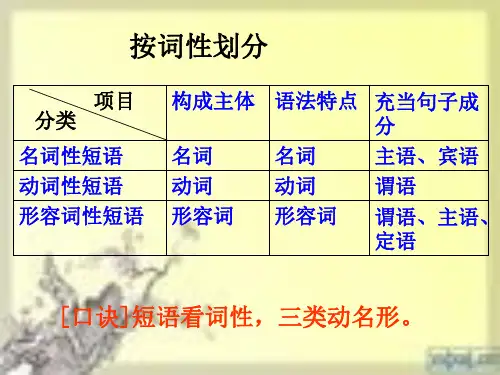
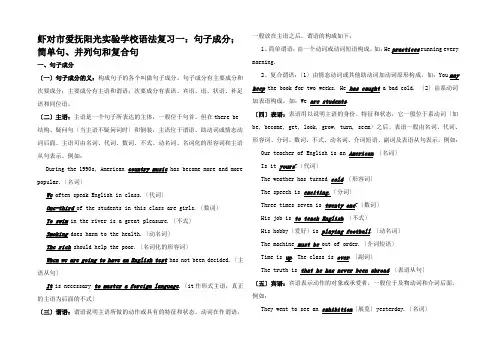
虾对市爱抚阳光实验学校语法复习一:句子成分;简单句、并列句和复合句一、句子成分〔一〕句子成分的义:构成句子的各个叫做句子成分。
句子成分有主要成分和次要成分;主要成分有主语和谓语;次要成分有表语、宾语、语、状语、补足语和同位语。
〔二〕主语:主语是一个句子所表达的主体,一般位于句首。
但在there be结构、疑问句〔当主语不疑问词时〕和倒装,主语位于谓语、助动词或情态动词后面。
主语可由名词、代词、数词、不式、动名词、名词化的形容词和主语从句表示。
例如:During the 1990s, American country music has become more and more popular.〔名词〕We often speak English in class.〔代词〕One-third of the students in this class are girls.〔数词〕To swim in the river is a great pleasure.〔不式〕Smoking does harm to the health.〔动名词〕The rich should help the poor.〔名词化的形容词〕When we are going to have an English test has not been decided.〔主语从句〕It is necessary to master a foreign language.〔it作形式主语,真正的主语为后面的不式〕〔三〕谓语:谓语说明主语所做的动作或具有的特征和状态。
动词在作谓语,一般放在主语之后。
谓语的构成如下:1、简单谓语:由一个动词或动词短语构成。
如:He practices running every morning.2、复合谓语:〔1〕由情态动词或其他助动词加动词原形构成。
如:You may keep the book for two weeks. He has caught a bad cold. 〔2〕由系动词加表语构成。
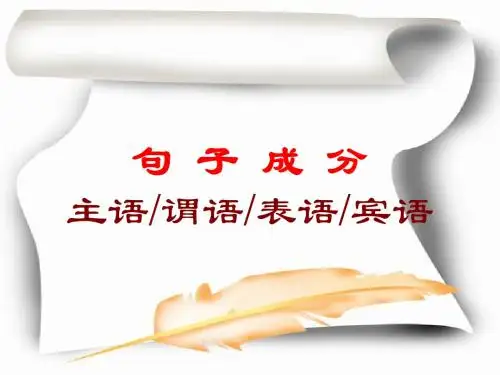
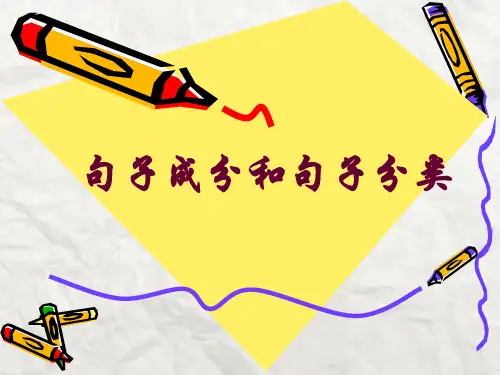
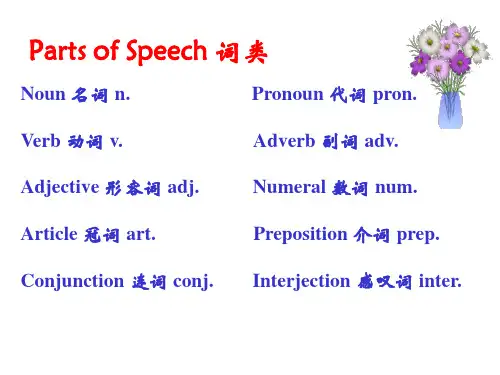
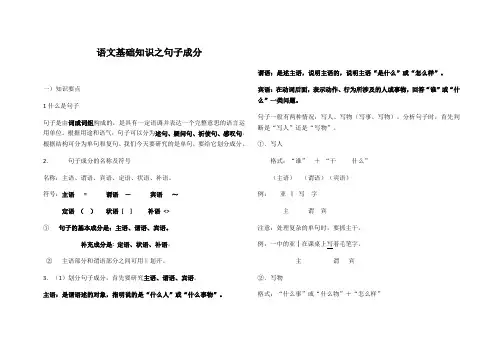
语文基础知识之句子成分一)知识要点1什么是句子句子是由词或词组构成的,是具有一定语调并表达一个完整意思的语言运用单位。
根据用途和语气,句子可以分为述句、疑问句、祈使句、感叹句。
根据结构可分为单句和复句。
我们今天要研究的是单句,要给它划分成分。
2.句子成分的名称及符号名称:主语、谓语、宾语、定语、状语、补语。
符号:主语= 谓语-宾语~定语()状语[ ] 补语<>①句子的基本成分是:主语、谓语、宾语。
补充成分是: 定语、状语、补语。
②主语部分和谓语部分之间可用‖划开。
3.(1)划分句子成分,首先要研究主语、谓语、宾语。
主语:是谓语述的对象,指明说的是“什么人”或“什么事物”。
谓语:是述主语,说明主语的,说明主语“是什么”或“怎么样”。
宾语:在动词后面,表示动作、行为所涉及的人或事物,回答“谁”或“什么”一类问题。
句子一般有两种情况:写人、写物(写事、写物)。
分析句子时,首先判断是“写人”还是“写物”。
①.写人格式:“谁”+“干什么”(主语)(谓语)(宾语)例:亚‖写字主谓宾注意:处理复杂的单句时,要抓主干。
例:一中的亚║在课桌上写着毛笔字。
主谓宾②.写物格式:“什么事”或“什么物”+“怎么样”(主语)(谓语、宾语)例:猫‖捉鱼主谓宾例:一只小猫‖在盆边捉了一条大鱼主谓宾注意:“是”为典型的动词,一般是“谓语”。
例如:他‖是学生主谓宾(2).划分句子成分,还要抓住枝叶(定语、状语、补语)定语:在句子中起着修饰、限制主语或宾语中心语的作用。
状语:修饰、限制谓语中心语,一般在谓语中心语前面,有的在句子最前面,交待时间、地点、围、情况等。
补语:对谓语中心语起补充说明作用,一般放在谓语中心语之后。
例:画眉唱歌这是一个把主语中心语、谓语中心语、宾语中心语单提出的句子。
原句是“两只美丽的画眉高兴地唱一首歌。
”①.(两只美丽的)画眉“两只美丽”是“画眉”--主语中心语的修饰部分,叫“定语”。
②.[高兴]地唱谓语中心语“唱”前边的修饰、限制成分--“高兴”为“状语”。
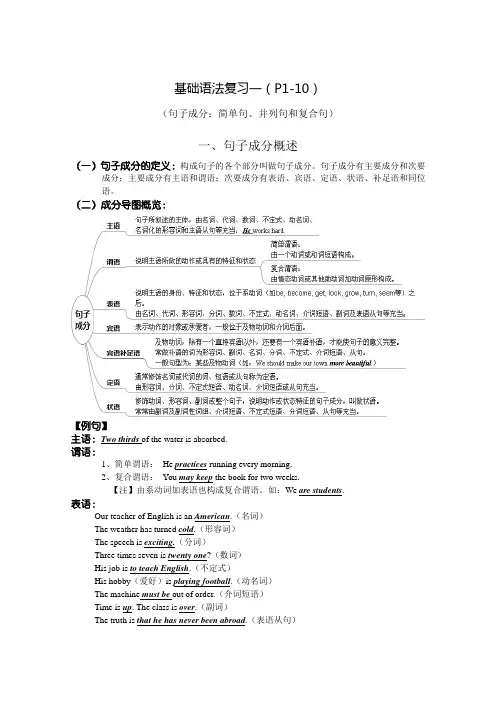
基础语法复习一(P1-10)(句子成分;简单句、并列句和复合句)一、句子成分概述(一)句子成分的定义:构成句子的各个部分叫做句子成分。
句子成分有主要成分和次要成分;主要成分有主语和谓语;次要成分有表语、宾语、定语、状语、补足语和同位语。
(二)成分导图概览:【例句】主语:Two thirds of the water is absorbed.谓语:1、简单谓语:He practices running every morning.2、复合谓语:You may keep the book for two weeks.【注】由系动词加表语也构成复合谓语。
如:We are students.表语:Our teacher of English is an American.(名词)The weather has turned cold.(形容词)The speech is exciting.(分词)Three times seven is twenty one?(数词)His job is to teach English.(不定式)His hobby(爱好)is playing football.(动名词)The machine must be out of order.(介词短语)Time is up. The class is over.(副词)The truth is that he has never been abroad.(表语从句)宾语:They went to see an exhibition(展览)yesterday.(名词)The heavy rain prevented me form coming to school on time.(代词)How many dictionaries do you have? I have five.(数词)They helped the old with their housework yesterday.(名词化形容词)He pretended not to see me.(不定式短语)I enjoy listening to popular music.(动名词短语)I think(that)he is fit for his office.(宾语从句)宾语补足语:His father named him Dongming.(名词)They painted their boat white.(形容词)Let the fresh air in.(副词)You mustn’t force him to lend his money to you.(不定式短语)We saw her entering the room.(现在分词)We found everything in the lab in good order.(介词短语)We will soon make our city what your city is now.(从句)定语:Guilin is a beautiful city.(形容词)China is a developing country; America is a developed country.(分词)There are thirty women teachers is our school.(名词)His rapid progress in English made us surprised.(代词)Our monitor is always the first to enter the classroom.(不定式短语)The teaching plan for next term has been worked out.(动名词)He is reading an article about how to learn English.(介词短语)状语:Light travels most quickly.(副词及副词性词组)He has lived in the city for ten years.(介词短语)He is proud to have passed the national college entrance examination.(不定式短语)He is in the room making a model plane.(分词短语)Wait a minute.(名词)Once you begin, you must continue.(状语从句)【巩固训练一】一、指出下列句子划线部分是什么句子成分:1. The students got on the school bus.2. He handed me the newspaper.3. I shall answer your question after class.4. What a beautiful Chinese painting!5. They went hunting together early in the morning.6. His job is to train swimmers.7. He took many photos of the palaces in Beijing.8. There is going to be an American film tonight.9. He is to leave for Shanghai tomorrow.10. His wish is to become a scientist.11. He managed to finish the work in time.12. Tom came to ask me for advice.13. He found it important to master English.14. Do you have anything else to say?15. To be honest; your pronunciation is not so good.16. Would you please tell me your address?17. He sat there, reading a newspaper.18. It is our duty to keep our classroom clean and tidy.19. He noticed a man enter the room.20. The apples tasted sweet.二、用符号划出下列短文各句中的主语(—)、谓语(=)、宾语(~):I hope you are very well. I'm fine, but tired. Right now it is the summer vacation and I'm helping my Dad on the farm. August is the hottest month here. It is the time of year for the rice harvest, so every day I work from dawn until dark. Sometimes we go on working after dark by the lights of our tractors. We grow rice in the south of the States, but in the north where it is colder they grow wheat. We have a lot of machines on the farm. Although the farm is large, my Dad has only two men working for him. But he employs more men for the harvest. My brother takes care of the vegetable garden. It doesn't often rain in the summer here. As a result, we have to water the vegetable garden. Every evening we pump water from a well. It then runs along channels to different parts of the garden.三、用符号划出下列短文各句中的定语(—)、状语(=)、补语(~):Most Saturday evenings there is a party, even at harvest time. These parties often make us very happy. We cook meat on an open fire outside. It's great! Americans eat a lot of meat — too much in my opinion. Some of my friends drink beer. I don't, because I have to drive home after the party. In your letter you asked about the time in different areas of the States. There are five different time areas in the States. In my state we are fourteen hours behind Beijing time. How many different time areas do you have in China? Well, I must stop and get some sleep. Please give my best regards to your parents.四、选择填空:1. ____ will leave for Beijing.A. Now there the manB. The man here nowC. The man who is here nowD. The man is here now2. The weather ____.A. wet and coldB. is wet and coldC. not wet and coldD. were wet and cold3. The apple tasted ____.A. sweetsB. sweetlyC. nicelyD. sweet4. He got up ____ yesterday morning.A. latelyB. lateC. latestD. latter5. The actor ______at the age of 70.A. deadB. diedC. dyedD. deaded6. ____ were all very tired, but none of ____ would stop to take a rest.A. We, usB. Us, weC. We, ourD. We, we7. He found the street much ______.A. crowdB. crowdingC. crowdedD. crowdedly8.I think _____necessary to learn English well.A. itsB. itC. thatD. that is9. The dog ____ mad.A. looksB. is lookedC. is being lookedD. was looked10.I will never forget the day ______ I joined the army.A. thatB. whenC. in whichD. where二、句子的种类(一)句子的分类导图【例句】判断下列句子所属:Be careful, boys; Don’t talk in classHow clever the boy is!He often reads English in the morning.Tom and Mike are American boys.She likes drawing and often draws pictures for the wall newspapers.You help him and he helps you.The future is bright; the road is tortuous.The foreign visitors took a lot of pictures when they were at the Great Wall.(二)简单句的五种基本句型及用法简介:英语基本句型有五个:S+V,S+V+Cs,S+V+O,S+V+Oi+Od,S+V+Od+Co,其共有特征是主谓结构(S+V)。
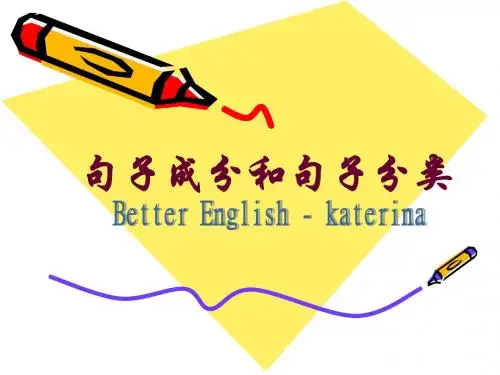

(完整word)辨析病句1—句子成分知识错误!1
一、句子成分知识
句子是具有一个句调(形式上带句号、问号、叹号),能够表达一个相对完整的意思的语言单位。
按不同的标准,句子可以分为多种类型,其中按结构可分为单句和复句两大类。
单句:单句是由短语或单个的词构成的句子。
句子成分知识一览表
(1)完整的句子结构
在一个完整、典型的句子中,句子各种成分之间的关系、顺序一般是:
[在自习课上],(全体) 同学 [都] 做〈完〉了(语文)作业.
(状) (定) (主)(状)(谓) (补) (定) (宾)
(2)句子成分位置口诀
主谓宾定状补,一般成分弄清楚.
基本成分主谓宾,附加成分定状补.
主语讲谁或什么,陈述主语是谓语。
动词涉及人或物,涉及成分叫宾语。
修饰限制算定状,补充说明就是补.
定语用在主宾前,谓前为状谓后补.
还有标志的地得,帮助分清定状补.
注意位置和关系,认真分析莫疏忽.
掌握六大句子成分的相对位置,对准确划分句子成分极为重要.正因为其位置是相对固定的,在把握了句子意思的基础上,如果确定了某个成分,其他成分就可以根据彼此间的相对位置和语意关系逐一确定。
一般来说,在分析句子成分时,最好先找出主语或谓语,然后根据位置推及其他成分.。
掌握句子成分的基本概念句子是一个完整的语言单位,由词组成,表达完整的意思。
在学习语法的过程中,理解句子的成分是非常重要的。
掌握句子成分的基本概念可以帮助我们更好地理解句子的结构和意义,提升写作能力和语言表达的准确性。
一、主语(Subject)主语是句子中的核心成分,通常指出句子是关于谁或者是关于什么的。
例如:- 我喜欢吃水果。
- 那只小猫在玩耍。
二、谓语(Predicate)谓语是句子中的另一个核心成分,表示主语的状态、行为或者性质。
例如:- 我喜欢吃水果。
- 他正在读书。
三、宾语(Object)宾语是谓语动词所作用的对象,通常回答“干什么”或“做什么”的问题。
- 我喜欢吃水果。
(喜欢吃什么?水果)- 她买了一本书。
(买了什么?一本书)四、状语(Adverbial)状语是修饰谓语或者整个句子的成分,用来说明时间、地点、方式、原因等情况。
例如:- 我昨天去了公园。
(状语:昨天)- 他慢慢地走进了教室。
(状语:慢慢地)五、定语(Attributive)定语是修饰名词或代词的成分,用来限定名词或代词的属性、特征或者状态。
例如:- 那个大房子很漂亮。
(定语:大)- 这篇有趣的文章引起了我的兴趣。
(定语:有趣的)六、补语(Complement)补语是补充说明主语或宾语的成分,对主语或宾语进行补充、扩展或者修饰。
- 他被选为班长。
(补语:班长)- 她是一名教师。
(补语:教师)七、同位语(Appositive)同位语是对一个名词或代词进行解释、说明或者补充,起到进一步限定或者解释的作用。
例如:- 他的同学李明是个优秀的运动员。
(同位语:李明)通过掌握句子成分的基本概念,我们可以更准确地理解句子的结构,从而更好地理解句子的意义和表达方式。
在写作中,我们可以利用句子成分的概念来构建清晰、准确的句子,提高语言表达的准确性和流畅度。
总结起来,句子成分分为主语、谓语、宾语、状语、定语、补语和同位语。
理解和掌握这些基本概念可以帮助我们更好地理解句子的结构,提高自己的写作能力。
现代汉语主语1.定义:是句子或说明的对象,说明是谁或什么。
表示句子说的是"什么人"或“什么事”。
是执行句子的行为或动作的主体。
2.特点:A、经常由、、性短语充当。
B、一般表示所说的是“谁”或“什么”。
例如:⑴(人民)定(志气)主(高)谓。
⑵提高整个中华民族的科学文化水平是亿万人民群众的切身事业。
3.符号:═。
主语多表示人或事物,是句子里被陈述的对象,在句首能回答“谁”或者“什么”等问题。
可由名词、代词、数词、名词化的形容词、、和等来承担。
例如:(1)今天晚上‖特别冷。
主语()谓语(2)[明天这个时候],我们‖就可以走出了。
状语(时间)主语(代词)谓语以动作、性状或事情做陈述的对象的主语句。
例如:(1)笑‖是具有多重意义的语言。
主语(动词)谓语(2)公正廉洁‖是行为的准则。
主语(形容词)谓语谓语1.定义:用来说明。
2.特点:A、经常由动词、形容词充当。
B、一般表示主语“怎么样”或“是什么”。
例如:⑴满天乌云顿时消散了。
⑵树叶黄了。
⑶小王今年十六岁。
⑷是的奠基人。
⑸明天星期日。
⑹什么书他都看。
3.符号:_____。
4.(predicate),是句子中的必不可少的成分.是由简单动词或(或+主要动词)构成.分为简单和复合谓语是用来陈述主语的,能回答主语“怎么样”或“是什么”等问题。
谓语可以由动词来担任,一般放在主语的后面。
(1)动词性词语经常做谓语。
例如:他‖[只]答应了<一声>。
主语谓语(+动词+)‖留下<过>(许多人)的梦。
主语谓语(动词+补语++)我‖[最近]去<了><一趟>北京。
主语谓语(状+动+补+宾)(2)形容词性词语也经常做谓语。
例如:太阳‖热烘烘的。
主语谓语(形容词+的)人参这种植物,‖娇嫩<极了>。
主语谓语(形容词+补语)说话‖[要]简洁<些>。
主语谓语(状语+形容词+补语)(3)做谓语。
例如:这件事‖大家都赞成。
语文句子成分分析教学知识点在语文学习中,句子成分分析是非常重要的一项知识点。
通过对句子进行成分分析,可以帮助我们更好地理解句子的结构和意义,提高语言表达的准确性。
本文将从主谓宾结构、定状补成分和状语等多个方面介绍句子成分分析的教学知识点。
【一、主谓宾结构】主谓宾结构是句子最基本的成分关系。
主语通常是句子中起主导作用的名词或代词,它执行着谓语所表示的动作或状态。
谓语是句子的核心,用来表达主语的动作或状态。
宾语是句子中被动作所作用的对象或接受动作影响的事物。
例如:他吃苹果。
主语:他;谓语:吃;宾语:苹果。
在教学中,可以通过举例子、配对练习等方式,引导学生识别和理解主谓宾结构。
【二、定状补成分】定状补成分是句子中对主语、谓语或宾语进行限制、修饰或补充说明的成分。
定语通常修饰名词或代词,起到限定范围或提供更多信息的作用。
状语通常修饰谓语,用来说明动作的时间、方式、原因等信息。
补语通常用来补充、说明宾语的特征、状态等。
例如:他穿着一件红色的衣服。
定语:一件红色的;状语:着;补语:衣服。
教学时可以通过给出简单句,让学生找出其中的定语、状语和补语,并分析其作用。
【三、状语】状语是对动词、形容词、副词等进行补充说明的成分。
它可以用来表示时间、地点、方式、原因等等,起到丰富句子意思的作用。
状语可以放在句子的任何位置,但它必须与被修饰的词保持一定的搭配关系。
例如:他昨天去了图书馆。
状语:昨天。
在教学中,可以通过给出一些常见的状语,让学生分析其作用和位置。
【四、其他成分】除了主谓宾结构、定状补成分和状语,句子中还有其他一些重要的成分。
例如,表语用来说明主语的特征、状态等;插入语用来插入语气、情感等信息;主谓结构用来强调主语或宾语等。
例如:他是个好学生。
表语:好学生。
在教学中,可以通过例句分析等方式,让学生了解这些成分的作用和特点。
【总结】通过以上的介绍,我们可以看到句子成分分析是语文学习中非常关键的一项知识点。
通过理解句子的成分结构,我们可以更好地分析句子的语法关系,更准确地理解和运用语言。